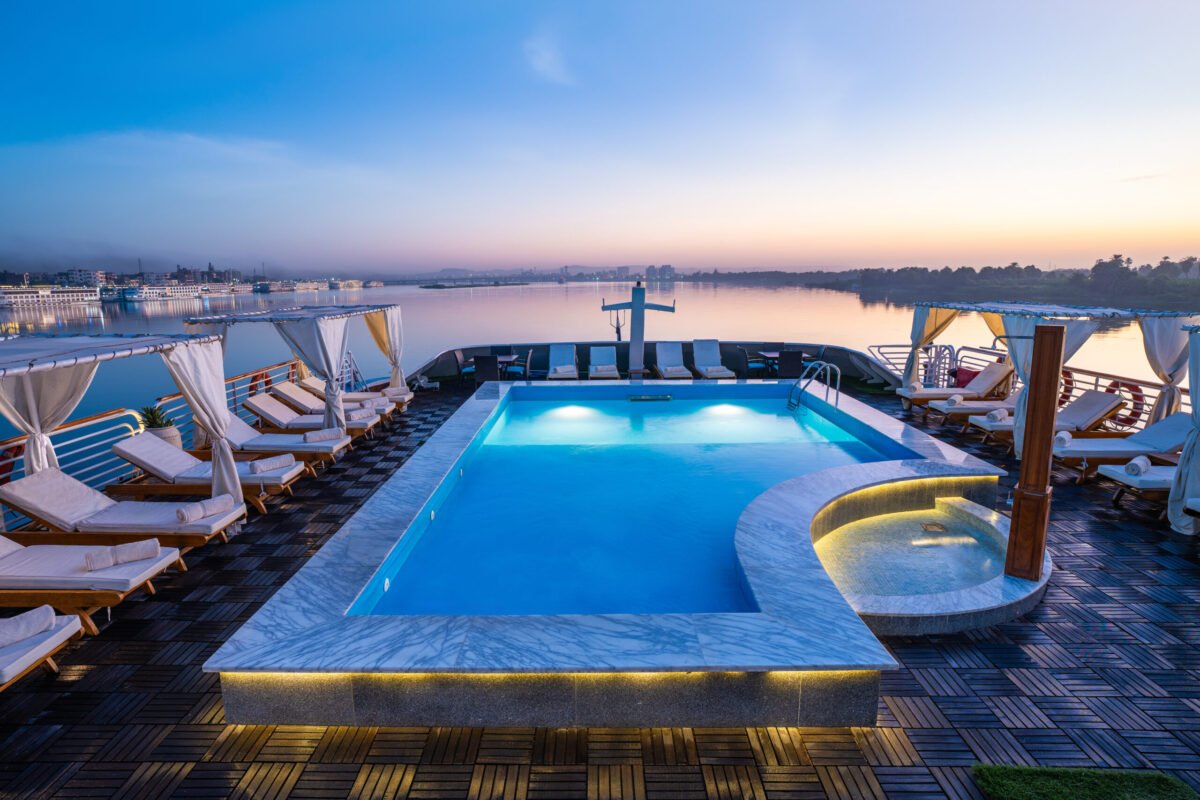A cruise on the Nile River is a great way to explore Egypt’s rich history and scenic scenery, especially between Luxor and Aswan. While you are preparing for this unforgettable trip, understanding the etiquette of behavior on the ship is very important to ensure an enjoyable experience for you and your travelers.

If there is one place that rivals the mystery of the pyramids, it’s perhaps the Nile River. Nile cruises in Egypt will hit you like a thrilling crash course on the ancient world, but with real-life wonders!
Each time, the scenery and stories are mesmerizing. But really, it’s the simple things that will shape your experience. Like, how you deal with the locals, how you dress, and even how to take photos without offending anyone.
It doesn’t matter if you’re still searching for the best Nile cruises (find top-rated Nile cruises in Egypt) or still sorting out top-notch Nile cruise packages. To experience Egypt the way it should be, look beyond the sights and itinerary.
A little awareness of Nile cruise cultural etiquette works miracles.
Don’t overthink stuff because this isn’t a list of rules. Just be mindful, and you’re sure to have a smooth, fab trip that’s well-received by the people who live there.
What to Wear on a Nile Cruise?
If you’ve never tried booking Nile cruises in the past (you can book from here), you might be wondering what to wear on your trip. Yep, packing the right clothes for any holiday can be tricky. But even more so when your destination is Egypt.
Daytime temps here are seriously high, even in the colder months. Still, you can’t wear shorts and tank tops out? Or can you? Before you start thinking whether this is some sort of injustice, let’s answer your question.
Good to Know: We’ve made an epic Nile cruise packing list. Do check it out!
General Cruise Attire.
Is there an Egypt Nile cruise dress code? Onboard, the mood tends to be pretty relaxed and easygoing. You don’t have to cover up, unless it’s for sun protection. Feel free to wear something cutesy and comfy and casual, as long as it’s decent (more on that below).
The Egyptian sun can be brutal. Doesn’t matter if it’s summer or winter. So, go for light, airy clothes made of linen, cotton, or quick-drying fabric. These usually don’t feel clingy, even if you sweat.
Pack a mix of flowy sundresses, loose trousers, and light-colored t-shirts. And surprise, you can wear sleeveless shirts and shorts on board. Just not the booty ones, please.
The vibe shifts to semi-formal when evening rolls. No need for a gown or tux. But do wear something suitable for a lovely dinner.
Collared shirts and chinos are great for men. Ladies, on the other hand, can never go wrong with the classic blouse and skirt combo or a dainty summer dress. Pack a pair of dressy sandals and nice loafers, too.
Some high-end Nile cruises in Egypt host themed white-tie events that scream evening wear in bold letters. Before sailing, check if your cruise is having luxurious dinners so you can prepare.
Even so, nobody’s kicking you out for not following the dress code. Still, you might feel a tad out of place in tattered shorts and flip-flops at a gourmet dinner.
Respectful Clothing for Shore Excursions.
What you wear suddenly becomes a huge deal once you disembark the cruise ship and step into an actual Egyptian town, a temple (doesn’t matter if it’s mostly ruins), and especially a mosque.
Off your boat, modesty and decency take center stage. It means no wearing of plunging necklines, miniskirts, crop tops, sheer fabrics, and body-fitting anything for women.
You don’t have to dress like the locals. Often, Capri pants, light trousers, or a skirt that goes below the knees is good enough. Pair this with a blouse or t-shirt. You can also opt for a loose, long dress with proper sleeves.
A scarf or a shawl is your best friend. It serves as an all-purpose cover-up. Wrap it around your shoulders or hair whenever you enter a holy site. If the sun gets too harsh, use the cloth as protection.
The dress code for men is more forgiving. But wearing short shorts, ripped jeans, and sleeveless shirts, especially in religious sites, will surely raise eyebrows. You might even be denied access.
Wear a regular T-shirt or polo paired with lightweight trousers or knee-length cut-off chinos. These are considered respectful and, at the same time, light enough that you won’t feel overheated.

Swimwear Etiquette.
Back on board, pools and sundecks are the only places you can wear that nice bikini or trunks. Nothing too revealing, though. That’s not just for modesty. It’s also to keep you from getting sunburned or feasted upon by mosquitoes if you swim at dusk.
You should cover up once you leave the pool area. You probably don’t mean to offend anyone, but you’ll surely get uncomfortable looks if you walk around the ship in nothing but a skimpy swimsuit.
Photography Do’s and Don’ts
Egypt is easily one of the most photogenic places on the planet. But if you think you can just point your camera everywhere and click away, think again. The country’s very restrictive photography rules make capturing the country’s beauty a pain.
A basic of Nile cruise cultural etiquette is to always ask before capturing someone’s image, especially women. And don’t photograph children. It’s illegal.
Also, taking pictures of soldiers, cops, and any other uniformed personnel is strictly prohibited. The same applies to official buildings, police stations, checkpoints, or military outposts.
Some historic sites, such as temples, tombs, and pyramids, allow photos for a fee. Others ban cameras altogether. If you’re a professional photographer, you’ll need a permit, which takes forever to process and costs a lot.
So, is there anything you can photograph, at all? Yup, mostly landscapes and landmarks. If you’re unsure whether or not to snap a pic, check for posted signs. Better yet, ask your guide.
Interacting with Locals.
Politeness & Greetings.
Most Egyptians are warm and friendly, so it’ll be easy for you to make friends. A heartfelt smile and a little wave go a long way. But it would also be nice to know a little Arabic, like shukran (thank you) and salaam alaikum (peace be upon you).
Locals are uncomfortable with open displays of affection. Doesn’t matter if you’re married or dating. Refrain from hugging, kissing, or even holding hands in public places.
Shaking hands is a popular greeting gesture, although it is not allowed between men and women.
Don’t use your left hand to eat, especially in a communal meal. That’s because the left hand is associated with cleaning yourself after using the toilet, hence “unclean.” In other words, it’s proper to eat with your right hand, as well as to receive and give money.
And a thumbs-up can mean the middle finger. So, just don’t.
Also, abstain from openly discussing sensitive topics, like politics and religion, if you don’t want to offend or get into an argument with anyone.
Tipping (Baksheesh).
Tipping is part of Egypt’s culture. It’s not mandatory, but it’s highly encouraged. The locals expect it from tourists.
If you use a public bathroom, an attendant will ask for a small tip. The same happens when you rent a lounge chair or have a porter bring your luggage. Food servers and housekeeping staff will also anticipate a tip.
How much should you tip, then? Ten to 20 EGP is usually enough for bathroom use in Egypt. So, always carry with you local currency in small denominations.
Your driver or guide will also expect a tip of around 10–40 USD at the end of the excursion. Or, if your excursion is part of the Nile cruise packages, you can wait until the end of the cruise to give a tip.
Visiting Mosques or Religious Sites.
If you visit a mosque, you have to remove your footwear before entering the building. There are shelves near the door where you can leave your shoes. You can tip an attendant to look after them.
Women are often required to cover their hair. At the entrance, you’ll find attendants handing out scarves. You can rent one for a small fee or bring your own.
Remember, dress respectfully. Choose modest attire that hides the shoulders and knees. Best to stick to sober, muted colored fabrics. Vivid colors like neon and tie-dye are considered inappropriate.
Once inside, avoid loud talking and boisterous laughter. Snapping photos and selfies is prohibited, especially when locals are praying. Or, you can schedule your visit outside prayer time to show respect.
Final Tips for a Respectful Journey
Sailing down the Nile is a trip that stays with you. Maybe even changes you. But it’s not just about the dazzling views. It’s also about how you interact with the people you meet on your cruise. Dress appropriately. Tip generously. Be polite. And respect the local customs. As long as you stick to the Nile cruise cultural etiquette, you’re good. You’ll have an incredible time on one of the world’s most captivating rivers. Happy cruising!
Trusted Partners
Nile Cruisen: Chosen by Leading Brands as Egypt's Top Cruise Operator











